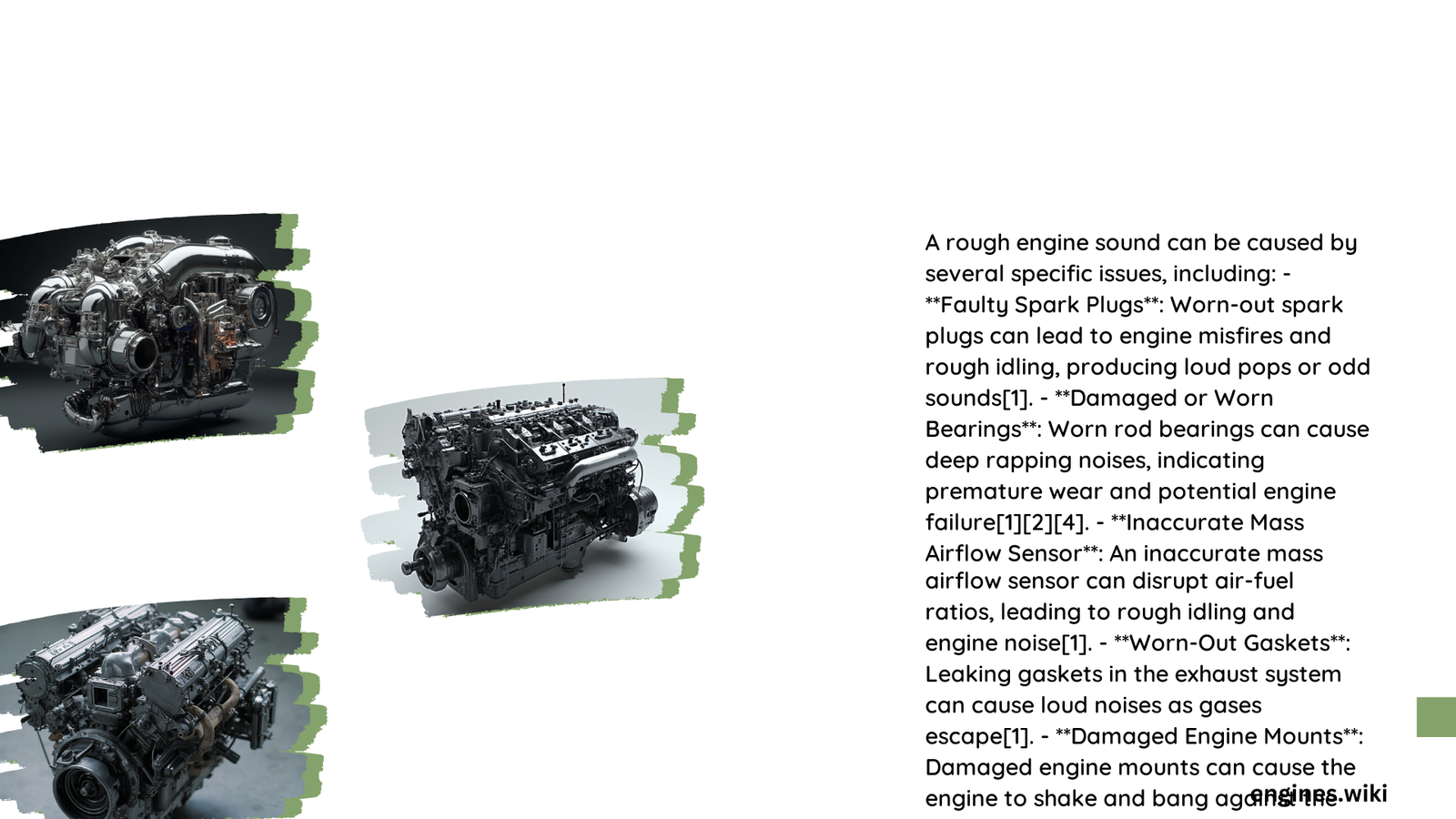Modern vehicles can develop rough engine sounds due to multiple complex mechanical and electrical interactions. When an engine starts producing unusual noises, it signals potential underlying problems that range from minor component wear to significant system failures. Understanding these intricate symptoms requires a systematic approach to diagnosis, involving precise technical knowledge and careful evaluation of multiple engine subsystems.
What Causes Rough Engine Sounds?
Why Do Spark Plugs Contribute to Engine Roughness?
Spark plugs play a critical role in engine performance. When they malfunction, they can cause significant disruptions in the combustion process. Here’s a detailed breakdown:
Spark Plug Wear Indicators
- Electrode Erosion: Indicates advanced wear
- Carbon Deposits: Suggests incomplete combustion
- Resistance Changes: Signals potential electrical system problems
| Spark Plug Condition | Performance Impact | Recommended Action |
|---|---|---|
| Normal Wear | Slight Performance Reduction | Monitor/Replace |
| Significant Erosion | High Misfire Risk | Immediate Replacement |
| Heavy Carbon Buildup | Reduced Fuel Efficiency | Clean/Replace |
How Do Compression Issues Create Rough Sounds?
Compression problems directly influence engine sound and performance. Low compression can result from:
- Worn Piston Rings
- Reduces sealing efficiency
- Causes uneven combustion
-
Leads to power loss
-
Damaged Valve Seals
- Creates oil leakage
- Reduces compression integrity
- Generates abnormal engine noises
What Role Do Ignition Coils Play in Engine Sound?
Ignition coils transform battery voltage into high-voltage electrical charges. Malfunctioning coils can cause:
- Intermittent spark delivery
- Uneven cylinder firing
- Pronounced engine roughness
Can Fuel System Problems Cause Rough Sounds?
Fuel system issues significantly impact engine performance:
Potential Fuel System Complications
- Clogged Fuel Injectors: Disrupts fuel spray pattern
- Contaminated Fuel Filter: Restricts fuel flow
- Fuel Pressure Irregularities: Creates combustion inconsistencies
How Do Environmental Factors Influence Engine Sound?
External conditions can exacerbate existing engine issues:
- Temperature Variations: Affect fuel vaporization
- Humidity Levels: Impact combustion efficiency
- Altitude Changes: Modify air-fuel mixture requirements
Diagnostic Strategies for Rough Engine Sounds

What Tools Help Diagnose Engine Problems?
Recommended diagnostic equipment:
– Professional-grade OBD-II scanners
– Compression testing tools
– Multimeters for electrical system evaluation
When Should Professional Intervention Occur?
Consider professional diagnostics when:
– Multiple diagnostic codes appear
– Sound persists after basic maintenance
– Performance significantly degrades
Preventive Maintenance Recommendations
- Regular spark plug inspection
- Consistent oil changes
- Fuel system cleaning
- Compression testing every 30,000 miles
Cost Considerations for Repairs
| Repair Type | Estimated Cost Range |
|---|---|
| Spark Plug Replacement | $100 – $300 |
| Ignition Coil Repair | $200 – $600 |
| Comprehensive Engine Diagnosis | $80 – $250 |
Key Takeaways
Rough engine sounds represent complex mechanical communication. Systematic diagnosis, timely maintenance, and professional assessment remain crucial for preserving vehicle performance and longevity.
